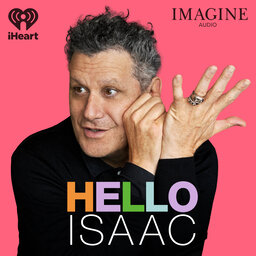Stage & Screen Legend, Alan Cumming
Isaac Mizrahi has a heartfelt and inspiring conversation with Alan Cumming about his harrowing childhood, why they never had an affair, his surprising connection to Judi Dench and more.
Follow Hello Isaac on @helloisaacpodcast on Instagram and TikTok, Isaac @imisaacmizrahi on Instagram and TikTok and Alan Cumming on Instagram @alancummingreally.
(Recorded on August 27, 2023)
In 1 playlist(s)
Hello Isaac with Isaac Mizrahi
Isaac Mizrahi is an expert - at almost everything! He’s an iconic fashion designer, actor, singer, …Social links
Follow podcast
Recent clips

Emmy-Winning Actor and Director, Pamela Adlon
51:37

Interior Designer & TV Host, Jeremiah Brent
49:51

Podcast Host & Crooked Media Co-Founder, Jon Lovett
50:53
 Hello Isaac with Isaac Mizrahi
Hello Isaac with Isaac Mizrahi